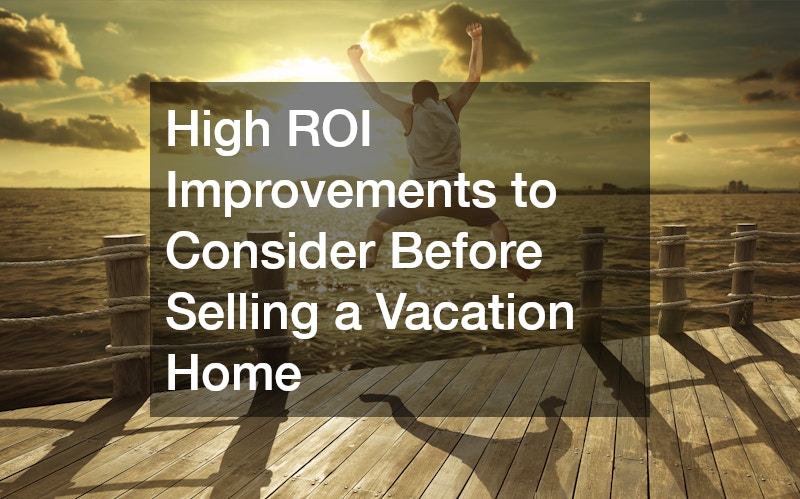In today’s competitive real estate market, vacation home sellers must be strategic to secure the best return on investment. While selling any property involves thoughtful preparation, vacation homes come with unique considerations—from location appeal to seasonal functionality. Enhancing a vacation property with the right improvements can significantly boost its value, increase buyer interest, and lead to a faster, more profitable sale. This article explores the most impactful upgrades and strategies to help sellers make informed decisions and maximize their ROI.
How to Determine the Best Improvements for Return on Investment?

Assessing Current Market Trends
Understanding what buyers are currently seeking is essential. Real estate markets are highly regional, so trends in one vacation destination may differ from another. In beachfront markets, outdoor entertaining areas might dominate buyer wish lists, whereas in mountain retreats, cozy interior features such as fireplaces may be more valuable. Studying recent local sales and analyzing what features correlate with higher sale prices will provide clear guidance. Speaking with a local real estate broker can also uncover neighborhood-specific insights and current buyer demands.
Leveraging Professional Appraisals
Hiring a professional appraiser before investing in upgrades can offer clarity on which aspects of the home hold the most potential for value increase. An appraisal gives a baseline value and highlights areas that may be limiting the home’s worth. It also offers an unbiased perspective that helps sellers avoid spending on improvements with minimal financial return.
Understanding Buyer Preferences
Today’s buyers are often looking for turn-key properties that require minimal work. Features such as updated kitchens, energy-efficient systems, and well-maintained outdoor spaces frequently appear on their must-have lists. Buyers are also increasingly attentive to the condition and appearance of a home’s exterior, including siding and roofing. Enlisting a siding contractor to inspect the home and potentially upgrade to fiber cement siding can offer both aesthetic appeal and improved durability—qualities that resonate with discerning buyers.
Balancing Costs vs. Expected ROI
Investing in renovations that have measurable ROI is crucial. Sellers should focus on improvements that directly correlate with increased sale prices, such as remodeling high-traffic areas or enhancing curb appeal. This cost-benefit analysis ensures that any money spent leads to greater financial returns.
Evaluating Local Regulations
Before making structural or aesthetic changes, it’s important to understand local building codes and zoning laws. These regulations may impact potential expansions or upgrades like adding a deck, converting a garage, or updating roofing materials. Working with licensed contractors ensures all improvements comply with local ordinances.
Which Interior Upgrades Yield the Highest ROI?
Kitchen Remodeling
The kitchen remains the focal point of any home. Modernizing this space by installing new countertops, upgrading appliances, and improving storage can dramatically elevate a home’s value. Stainless steel appliances, stone countertops, and open shelving are particularly appealing in vacation properties where style meets functionality.
Bathroom Renovation
Well-appointed bathrooms rank high on buyers’ wish lists. Renovations may include new fixtures, walk-in showers, and contemporary vanities. Even modest updates like replacing old faucets or retiling shower areas can provide a strong return on investment.
Flooring Replacement
Replacing worn or outdated flooring makes a significant impression. Hardwood floors are timeless, but tile flooring is especially valuable in warm or coastal climates due to its durability and ease of maintenance. Updated flooring elevates the look and feel of the entire home, creating a more polished and move-in-ready atmosphere.
Modernizing Lighting Fixtures
Lighting plays a pivotal role in establishing a warm, welcoming environment. Replacing old, dim fixtures with bright, energy-efficient options can transform the ambiance. Smart lighting systems also allow remote control and mood setting, adding modern convenience.
Painting and Wall Treatments
A fresh coat of paint is one of the most cost-effective ways to improve a home’s interior. Neutral colors appeal to a broad audience and help buyers envision themselves in the space. Accent walls, textured finishes, and subtle wall treatments offer additional flair without overwhelming the design.
How Can Landscaping Improve Property Appeal?
Curb Appeal Enhancements
First impressions matter. A well-landscaped exterior makes a home feel more inviting and cared for. This includes healthy lawns, pruned shrubs, and colorful flowers. Services like roof cleaning, which remove moss or debris buildup, also enhance the overall aesthetic. Hiring companies that offer roof cleaning services ensures that both landscaping and the home exterior look pristine for showings.
Outdoor Living Spaces
Decks, patios, and fire pits can increase a property’s usable space and appeal. Vacation home buyers often prioritize areas for entertaining or relaxing outdoors. Well-placed furniture, shade structures, and built-in features such as outdoor kitchens create a resort-like experience.
Eco-Friendly Plantings
Drought-resistant plants and native landscaping are increasingly desirable, especially in environmentally sensitive areas. These not only reduce water use but also lower maintenance for future homeowners.
Regular Maintenance and Upkeep
A beautifully landscaped yard must be maintained. Tree overgrowth or dead limbs can be hazardous and unsightly. Hiring a professional tree removal service is essential to keep the property safe and visually pleasing, especially if overhanging branches obscure views or threaten the roof.
Water Features and Fencing
Water features like fountains or small ponds add tranquility and charm. Functional fencing can delineate space, enhance privacy, and ensure pet or child safety—features that many vacation home buyers value.
What Are the Most Effective Staging Strategies?

Highlighting Unique Features
Every vacation home has something special to offer—be it ocean views, a cozy fireplace, or a rustic exposed beam ceiling. Staging should highlight these unique elements to create a memorable first impression.
Using Neutral Palettes
Neutral colors are soothing and appeal to the broadest range of buyers. Whites, beiges, and soft greys allow buyers to imagine their own furnishings and style in the home.
Decluttering and Depersonalization
Removing personal items and excess clutter makes spaces feel larger and more inviting. A clean, minimalist aesthetic allows buyers to focus on the home’s architecture and features rather than distractions.
Strategic Furniture Arrangement
Proper furniture placement enhances room flow and functionality. Sellers should arrange furnishings to maximize space, encourage movement, and emphasize natural light sources.
Enhancing Virtual Tours
In today’s digital world, virtual tours are a must. High-quality visuals, 3D walkthroughs, and drone footage can captivate buyers browsing from afar. This is especially important for vacation homes, which often draw out-of-town interest.
What Are Smart Home Technologies Worth Investing In?
Security and Surveillance Systems
Security is a top priority for many buyers, particularly for vacation properties that may be vacant part of the year. Installing smart locks, surveillance cameras, and motion sensors boosts buyer confidence and property value.
Temperature Control Solutions
Programmable thermostats and zoned heating or cooling systems allow owners to control energy usage from anywhere. These systems appeal to eco-conscious buyers looking to reduce utility costs and maintain comfort.
Voice-Activated Assistants
Smart hubs and voice-controlled assistants like Amazon Alexa or Google Home offer convenience and connectivity. Buyers appreciate homes that support automation for lighting, music, and home operations.
Energy-Efficient Appliances
Upgrading to ENERGY STAR-rated appliances not only lowers energy costs but also demonstrates a commitment to sustainability. Modern appliances are also quieter and more stylish—an added benefit in vacation homes.
Integrated Entertainment Systems
Built-in sound systems, smart TVs, and home theater setups offer immersive experiences that enhance a vacation lifestyle. These features are particularly valuable in properties marketed as high-end or luxury getaways.
Is It Worthwhile to Upgrade Windows and Doors?

Energy Efficiency Benefits
New windows and doors improve insulation, which is crucial in both hot and cold climates. These upgrades can help maintain a consistent indoor temperature and reduce reliance on HVAC systems, leading to lower energy bills for future owners.
Aesthetic Improvements
Modern frames, clean lines, and quality materials can greatly enhance a home’s visual appeal. Windows and doors are focal points, and updating them can instantly modernize the property’s facade.
Enhancing Natural Light
Maximizing natural light improves mood and makes spaces feel larger. Replacing small or outdated windows with larger panes, or adding sliding glass doors to patios, can dramatically transform interiors.
Noise Reduction Advantages
Vacation homes near busy roads or tourist areas benefit from soundproofing. High-quality, insulated windows and doors reduce exterior noise, making the home more relaxing and private.
Long-Term Durability Considerations
Durable materials like impact-resistant glass and weather-sealed frames offer longevity and protection against the elements. Roofers often recommend pairing window and door upgrades with improved roofing systems, such as tile roofing or metal roofing, to ensure the entire home envelope is well-protected and energy efficient.
How to Address Necessary Repairs Before Listing?
Identifying Critical Repairs
Visible damage—such as water stains, cracks, or broken fixtures—must be addressed before listing. These flaws can raise red flags for buyers and stall negotiations.
Prioritizing Safety Issues
Issues like faulty wiring, leaky roofs, or unsafe stair railings must be resolved to pass inspections and reassure buyers. Roofing issues, in particular, can significantly impact a home’s value and safety. Collaborating with trusted roofers ensures that the roof is secure, clean, and presentable.
Hiring Qualified Professionals
Whether the home needs electrical upgrades, siding repair, or gutter maintenance, it’s critical to hire qualified experts. For example, local gutter contractors and local siding companies offer specialized knowledge and can complete projects quickly and effectively to meet selling timelines.
Budgeting for Unexpected Costs
Home repairs often uncover hidden issues. Sellers should set aside a contingency fund to handle surprises without disrupting the selling schedule.
Documenting Repair Work
Keeping records of all repairs and upgrades provides transparency for buyers and demonstrates that the home has been well-maintained. This can give buyers added peace of mind and improve negotiating leverage.
What Role Does Energy Efficiency Play in Selling a Home?
Cost Savings for Potential Buyers
Energy-efficient homes typically have lower operating costs, which appeals to buyers looking for long-term savings. Highlighting these advantages in the listing can attract more offers.
Green Certifications and Incentives
Homes that meet certain efficiency standards may qualify for green certifications, making them more attractive to environmentally conscious buyers. Some areas offer tax incentives or rebates for upgrades like solar panels or high-efficiency HVAC systems.
Upgrading Insulation and HVAC Systems
Improving insulation and installing modern heating and cooling systems increases comfort and reduces utility bills. These updates are especially valuable in vacation homes, where buyers may be less familiar with seasonal performance.
Solar Panel Installations
Solar energy continues to grow in popularity. A well-designed solar system can generate significant cost savings and boost the property’s value, especially in sunny regions.
Energy Audits and Performance Ratings
An energy audit provides a comprehensive overview of the home’s efficiency. Sharing the results with buyers adds credibility and shows that the seller has invested in long-term value.
Should You Consider Increasing Living Space?

Adding Extra Bedrooms or Bathrooms
If the property layout allows, additional bedrooms or bathrooms can significantly increase market value. More rooms translate to more flexible use cases—accommodating families, renters, or guests.
Creating a Finished Basement or Attic
Transforming unfinished spaces into usable rooms adds value without expanding the home’s footprint. Finished basements or attics can serve as game rooms, offices, or guest suites.
Expanding Outdoor Living Areas
Outdoor kitchens, lounges, and covered patios add usable square footage and appeal to vacationers seeking al fresco lifestyles. These additions are often cost-effective and eye-catching.
Garage Conversions
Converting a garage into a home gym, office, or guest suite creates additional functionality. This is especially popular in resort towns where space is limited and flexibility is valued.
Evaluating Permitting Requirements
Major renovations may require permits. Understanding local regulations and working with professionals ensures all work is legal and safe.
How Important is Marketing in Selling a Vacation Home?
Crafting an Engaging Listing
The listing description should highlight the home’s best features, upgrades, and vacation appeal. Mentioning recent improvements like new fiber cement siding or a freshly cleaned roof can make a strong impression.
Selecting the Right Platform for Listings
Choosing where to list the property is just as important as how it’s presented. Working with a local real estate broker ensures the home is promoted through the most effective channels, both online and offline.
Utilizing Social Media & Online Ads
Digital platforms like Facebook, Instagram, and Google Ads can reach targeted audiences, especially buyers searching for second homes or investment properties.
Professional Photography and Videography
High-resolution images and professionally shot videos are essential. A well-crafted visual presentation can captivate buyers and encourage them to book showings—even from afar.
Hosting Open Houses and Tours
Open houses and virtual tours give buyers a chance to experience the property firsthand. Staged homes, coupled with clean exteriors and tidy landscapes, leave a lasting positive impression.
Final Thoughts
Selling a vacation home is an intricate process that requires thoughtful planning, strategic improvements, and smart marketing. By focusing on high ROI upgrades, such as modern interiors, updated roofing and siding, energy efficiency, and professional landscaping, sellers can significantly enhance their property’s appeal. Collaborating with local experts like roofers, siding contractors, and real estate brokers ensures that each aspect of the home is optimized for market success. With the right preparation, sellers can achieve a faster sale and a higher return, turning their vacation property into a valuable financial asset.




